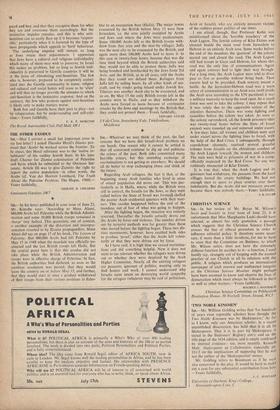SIR,—Whatever we may think of the past, the fact remains
that we have this Israeli-Arab problem on our hands. One reason why it cannot be settled is. that all concerned continue to dig up and publicise. the crimes of the past. Both sides committed many horrible crimes, but this unending exchange of recriminations is not getting us anywhere. We should all do better to stop exchanging abuse and think of the future.
Regarding Arab refugees, the fact is that, at the beginning, many Arab families who lived in areas • of mixed population did move out. This was par- ticularly so in Haifa, where; while the British were still in control, the Israelis (or the Jews, as they were called before the State of Israel was formed) shelled the poorer Arab residential quarters with their mor- tars. This exodus happened before the end of the mandate, out of fear of what was going to happen.
After the fighting began, the situation was entirely reversed. Thereafter the Israelis actually drove out the Arabs by force and violence. The number driven out by terrorist methods was far greater than those who moved before the fighting began. These two.dis- tinct movements, however, have enabled both sides to produce 'proof,' either that the Arabs left volun- tarily or that they were driven out by force.
As I have said, it is high time we ceased recrimina- tions and did something helpful. Now it does not seem to me relevant whether the refugees were driven out or whether they were deceived by the Arab Higher Committee. Nearly all the existing refugees are peasants, ignorant of politics, wanting only to find homes and work. I cannot understand why Israelis seem intent on destroying world sympathy for the refugees (whatever may be said of politicians, Arab or Israeli), who are entirely innocent victims of the ruthless power politics of our times.
I am afraid, though, that Professor Kohn was misinformed about the 'horrible treachery' of the Arab Legion. The Jewish colony of Kfar Etzion was situated beside the main road from Jerusalem to Hebron in an entirely Arab area. Some weeks before the end of the mandate, the 'garrison' of the colony moved out and closed the road. The Arab Legion still had troops in Gaza and Hebron, for whom this road was the only line of communications. Again and again convoys had to fight their way, through. For a long time, the Arab Legion were told to drive past as fast as possible without firing back. Then escorts had to be provided. Each convoy meant a battle. As the Jerusalem-Hebron road was a main artery of communication in an Arab area (well inside the Arab yea according to the UN partition) it was a military necessity to keep the road open. So a small force was sent to take the colony: I. may repeat that it was solely due to the aggressive action of the colonists themselves. There was some fighting and casualties before the colony was taken. As soon as the colony surrendered, all the Jewish prisoners (this was twenty-four hours before the State of Israel existed) were rounded up and removed under escort. A few .clays later, all women and children were sent under escort across the fighting lines to Israel, with the help of the Red Cross. I subsequently, through roundabout channels, received several grateful tributes from Israelis on the chivalrous conduct of the Arab Legion towards the women and children, The men were held as prisoners of war in a camp, officially inspected by the Red Cross. No one was
ruthlessly massacred at Kfar Etzion. • It is true that, when the :Arab Legion and its prisoners had withdrawn, the peasants from the local villages looted the empty buildings. We had not enough men to spare to' place sentries over them indefinitely. But the Arabs did not massacre anyone because there was nobody there.—Yours faithfully.
J. B. GLUBII


































 Previous page
Previous page